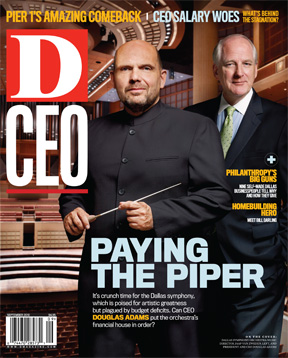Dallas nonprofit groups, including arts nonprofits, are having a rough go of things in the wake of the Great Recession.
As explained in this month’s cover story, “Playing for Time,” expenses at the Dallas Symphony Orchestra are up and revenues are down, as corporate and individual benefactors have pulled back on their giving. Even the shiny new AT&T Performing Arts Center has watched contributions to its capital campaign slow.
Advocates for the performing arts center, who have raised more than $334 million over a decade, insist that the center has not stretched arts donors’ budgets to the max, leaving far less money for competing groups, as some nonprofits charge.
And they might even be right about that.
There’s no doubt, though, that nonprofit fundraising, especially for the arts, has entered a challenging new phase. It’s one in which results are being measured by philanthropists more rigorously than ever. At the same time it’s said that traditional reasons for giving—noblesse oblige, civic pride—hold less water for many of today’s younger, more globally minded donors.
The deficit-plagued Dallas symphony may have run headlong into some of these trends. It’s especially bad timing for the DSO, which by all accounts is on the cusp of artistic greatness under its dynamic music director, Jaap van Zweden. So, how does the DSO convince companies and individuals that its mission is still worthy of their financial support?
Not everyone, believe it or not, thinks that all regional symphony orchestras are worthy. In a recent article in the Wall Street Journal, drama critic Terry Teachout argued that since Western classical music can be appreciated in many alternative ways in our iPod age, orchestras that don’t “redefine” their traditional missions may not deserve to survive.
But Judith Kurnick, a spokeswoman for the League of American Orchestras, says that orchestras are important to their communities for a variety of reasons. One of them, interestingly, is the collaborative example they set.
“A lot of research shows that musicians are models for the way they work hard together as a team to create something excellent, something vital and important,” Kurnick says. Orchestras also need to be “relevant” to young people, she cautions, especially because arts education in the schools has been so sharply curtailed.
The DSO seems to be listening. Van Zweden told us about a new program for young people the Dallas orchestra will launch this season. Douglas Adams, the symphony’s president and CEO, says a new study is looking at using the orchestra in nontraditional ways. Another study is considering innovative changes to the way tickets are priced, he says, and a third is plotting yet another capital campaign.
All of which sounds great.
The key for the DSO going forward, though, will be convincing Dallasites that the orchestra remains important and relevant to their hectic lives. And then taking timely, effective, decisive action to turn their enthusiasm for the symphony into cold, hard cash.
Here’s hoping Doug can pull it off.





